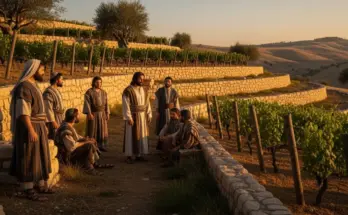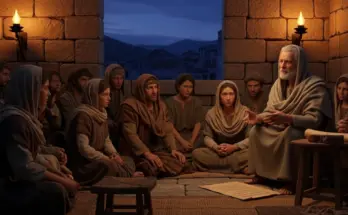What if God placed us in this moment for a specific purpose? In Esther Chapter 4, we see a young queen face that very question. With the Jewish people facing annihilation, Mordecai urges Esther to act. But stepping forward could cost her life.
Fear and uncertainty threaten to paralyze her, yet Mordecai’s words challenge her thinking: “Who knows but that you have come to your royal position for such a time as this?” This pivotal moment in Esther’s life teaches us about courage, faith, and divine timing.
Sometimes, we find ourselves in situations where doing the right thing feels risky. Esther’s story reminds us that faith requires action. Her decision to fast and seek God’s guidance before approaching the king shows us the power of surrender and trust.
Esther Chapter 4 is more than history; it’s a challenge to trust God’s purpose in our lives. Are we willing to step forward when the time comes? Let’s explore this chapter and uncover how God calls His people to act in crucial moments.
Mordecai’s Public Mourning (Esther 4:1–3)
1 When Mordecai learned all that had been done, Mordecai tore his clothes and put on sackcloth and ashes, and went out into the midst of the city, and he cried out with a loud and bitter cry. 2 He went up to the entrance of the king’s gate, for no one was allowed to enter the king’s gate clothed in sackcloth. 3 And in every province, wherever the king’s command and his decree reached, there was great mourning among the Jews, with fasting and weeping and lamenting, and many of them lay in sackcloth and ashes.
After learning about the king’s decree to destroy the Jews, Mordecai responds in the traditional signs of mourning—tearing his clothes, wearing sackcloth and ashes, and crying out in the city. He doesn’t hide his grief. Verse 3 shows that his reaction was shared by Jews throughout the empire: there was fasting, weeping, and lamenting in every province. This was more than personal sorrow—it was communal devastation. The outward display of mourning underscores the desperate situation and sets the stage for a spiritual response.
Esther’s Concern and Inquiry (Esther 4:4–6)
4 When Esther’s young women and her eunuchs came and told her, the queen was deeply distressed. She sent garments to clothe Mordecai, so that he might take off his sackcloth, but he would not accept them. 5 Then Esther called for Hathach, one of the king’s eunuchs, who had been appointed to attend her, and ordered him to go to Mordecai to learn what this was and why it was. 6 Hathach went out to Mordecai in the open square of the city in front of the king’s gate,
Esther is initially unaware of the decree. Her servants inform her of Mordecai’s condition, which troubles her deeply. She tries to send him clothes—perhaps hoping he will cease his public mourning—but he refuses them. This signals that something serious is wrong. Esther then sends Hathach, a trusted eunuch, to find out what has happened. Her concern is sincere, but at this point, she is still somewhat removed from the gravity of the national crisis.
Mordecai’s Plea for Esther’s Help (Esther 4:7–9)
7 and Mordecai told him all that had happened to him, and the exact sum of money that Haman had promised to pay into the king’s treasuries for the destruction of the Jews. 8 Mordecai also gave him a copy of the written decree issued in Susa for their destruction, that he might show it to Esther and explain it to her and command her to go to the king to beg his favor and plead with him on behalf of her people. 9 And Hathach went and told Esther what Mordecai had said.
Through Hathach, Mordecai explains everything to Esther: Haman’s bribe, the signed decree, and the threat to all Jews. He even provides a copy of the edict so Esther can see it with her own eyes. Then he urges her to go to the king and plead for her people. This is a significant moment—Mordecai is calling on Esther to use her royal position not for comfort or safety but for deliverance. He’s asking her to risk everything.
Esther’s Fear of the King’s Law (Esther 4:10–12)
10 Then Esther spoke to Hathach and commanded him to go to Mordecai and say, 11 “All the king’s servants and the people of the king’s provinces know that if any man or woman goes to the king inside the inner court without being called, there is but one law–to be put to death, except the one to whom the king holds out the golden scepter so that he may live. But as for me, I have not been called to come in to the king these thirty days.” 12 And they told Mordecai what Esther had said.
Esther’s response reveals the danger she faces. The law of the Medes and Persians forbids anyone from approaching the king uninvited. The penalty is death unless the king extends his golden scepter. Esther explains that she hasn’t been summoned in thirty days. Her hesitation is not from cowardice but from the real threat to her life. Even as queen, she is not above the law. This underscores the risk and weight of what Mordecai is asking her to do.
Mordecai’s Challenge to Esther (Esther 4:13–14)
13 Then Mordecai told them to reply to Esther, “Do not think to yourself that in the king’s palace you will escape any more than all the other Jews. 14 For if you keep silent at this time, relief and deliverance will rise for the Jews from another place, but you and your father’s house will perish. And who knows whether you have not come to the kingdom for such a time as this?”
These are the most famous verses in the book. Mordecai responds boldly, warning that silence will not spare Esther. If she doesn’t act, help will come another way—but she and her father’s house may perish. Then he poses a profound question: “And who knows whether you have not come to the kingdom for such a time as this?” This rhetorical challenge shifts the focus from fear to purpose. Mordecai believes God’s providence has placed Esther where she is—now she must choose courage.
Esther’s Decision and Call to Fast (Esther 4:15–17)
15 Then Esther told them to reply to Mordecai, 16 “Go, gather all the Jews to be found in Susa, and hold a fast on my behalf, and do not eat or drink for three days, night or day. I and my young women will also fast as you do. Then I will go to the king, though it is against the law, and if I perish, I perish.” 17 Mordecai then went away and did everything as Esther had ordered him.
Esther rises to the occasion. She calls for a corporate fast—three days with no food or drink. This act implies prayer and total dependence on God, though God is never directly mentioned. Esther also commits to going before the king, knowing it may cost her life: “If I perish, I perish.” This is the moment her identity shifts. No longer simply a young woman reacting to events, Esther now becomes an active participant in God’s plan. Mordecai obeys and carries out her instructions, signifying full support for her courageous stand.
This chapter highlights a defining moment in Esther’s journey—one that calls for courage, faith, and trust in God’s timing.
Closing Thoughts on Esther
Esther Chapter 4 challenges us to trust God’s purpose, even when fear threatens to hold us back. Esther faced an impossible choice—risk her life or remain silent. Yet, through fasting and faith, she found the strength to act.
Like Esther, we may face moments where obedience feels risky. However, God’s timing is always perfect. He places us where we need to be for His greater plan. Mordecai’s words remind us that God’s deliverance will come, but we must choose whether to be part of it.
Let’s meditate on these verses and ask God to strengthen our faith. Are we willing to stand for truth, even when it’s difficult? Are we seeking His guidance through prayer and fasting like Esther?
The Bible is filled with stories of God’s faithfulness in impossible situations. Keep studying His Word, trusting that He restores every part of our lives. As we continue in Scripture, we gain wisdom, courage, and clarity for our own purpose.
Take time today to reflect on Esther Chapter 4. Let God’s Word shape your decisions, strengthen your faith, and prepare you for such a time as this.
Frequently Asked Questions (FAQ)
1. Why did Mordecai refuse to wear the clothes Esther sent him? Mordecai was in deep mourning over Haman’s decree to destroy the Jews. Sackcloth and ashes were a public expression of grief and repentance. By refusing Esther’s clothes, he signaled that the crisis was far from over and that action, not comfort, was needed.
2. Why was Esther afraid to approach the king? Persian law stated that anyone who approached the king without being summoned could be put to death unless the king extended his golden scepter. Esther had not been called for thirty days, making her uncertain of the king’s favor. Despite the risk, she chose faith over fear.
3. What does “for such a time as this” mean? Mordecai’s words in Esther 4:14 remind us that God places people in specific moments for a greater purpose. Esther’s position as queen was not a coincidence—she had an opportunity to save her people. This phrase encourages us to recognize God’s divine timing in our own lives.



